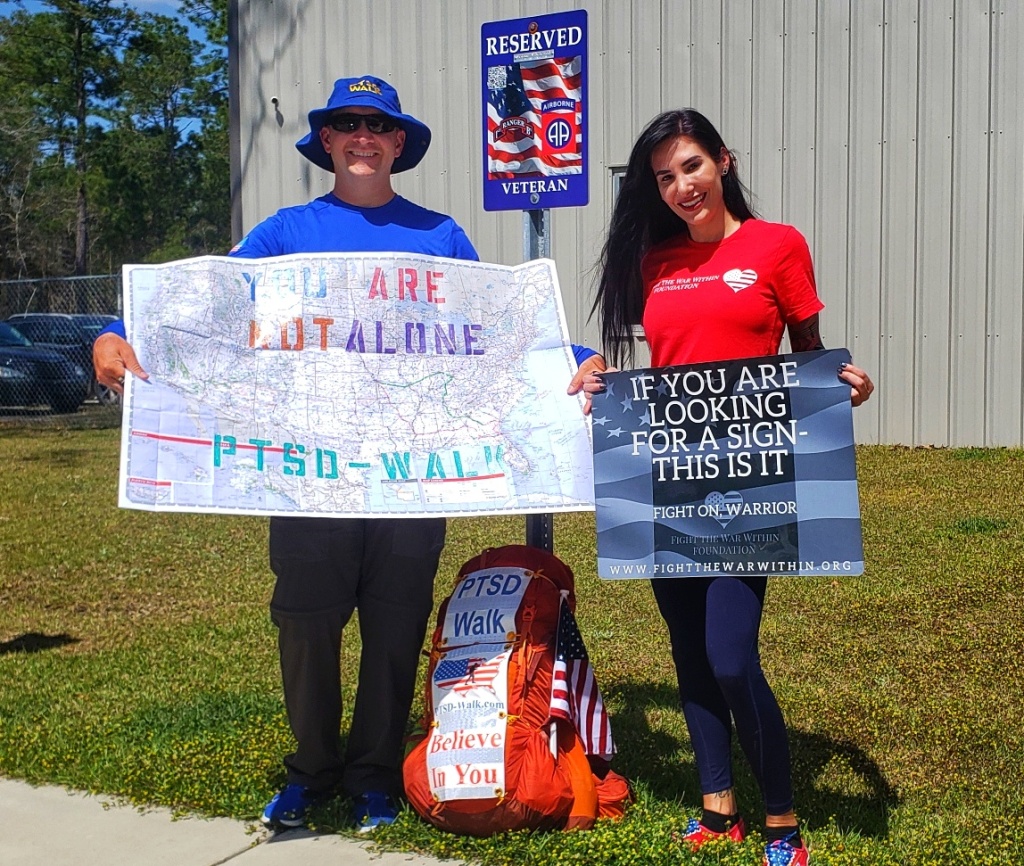My name is Steve Meyers and I am walking over 3,300 miles to raise awareness of post-traumatic stress. When I began my journey of crossing the USA on foot a little over 1,700 miles ago, I had no idea how the journey would change me. Initially I thought I would tell people my story. The roadside bomb attack, how we tried to save people from dying, and my emotional trauma. I thought I would try and connect people with counselors at no cost to the patients. The more I spoke with people, the more I found that my personal experience had so many similarities with their own experiences. I had a bad counselor match. As a result of that brief interaction, I didn’t seek help again until years later.






A Vietnam Veteran in Illinois had lost faith in the Veterans Affairs’ (VA) ability to help him. He had finally gotten the courage to seek help for Post-Traumatic Stress. The state of Illinois required the VA to notify them of those seeking mental health care. The state of Illinois then told the Vietnam Veteran that he could no longer have firearms. The Veteran made the decision he would rather have his firearms than seek help. So, he denied seeking his much needed mental health care, in order to keep his firearms.
Firefighters in Indiana told me how they got vested for retirement at 20 years, and that they would not risk losing their retirement by getting mental health support before then. A quick note – more Firefighters commit suicide than die doing that dangerous job.
Police Officers In Kentucky told me how seeking help would jeopardize their jobs, so they wouldn’t pursue care. Others who had lost their jobs contacted me and told me that this was the reason they were cut from the force. Another quick note – Police Officers take their own lives at a higher rate than are killed in the line of duty.



While walking though Union, KY, a firefighter stopped me to chat. He gave me the contact information for Jeff Dill, the founder of Firefighter Behavior Health Alliance. Jeff, a retired Firefighter and mental health counselor who had created a list of vetted counselors. He said something to the effect of, “It makes no sense to pair up a trauma patient with someone who does not know how to help with trauma”.
I spoke with Nashville Metro Police, and they told me about their Peer Support program. Officers typically felt comfortable talking with other officers about things before going to a counselor. There are Officers who go through a Peer Support training and wear a pin that designates them as Peer Support. Officers typically go to them before they will go to a counselor. They CAN still go directly to a counselor if they want, but most choose to go to a fellow Officer. It creates a safety net, so that if the counselor is a bad match, the officer falls back onto the Peer Support Program.
Before the COVID-19 shutdowns, I had heard about another person walking across the USA. I got in contact with John Ring of Buddy Watch Walk, who had started his walk on Tybee Island, GA. Unfortunately, we lost touch during the pandemic. Then, while walking through Metter, GA, I met up with Tim Spencer, a fellow Veteran of Foreign Wars (VFW). He said that I was the 2nd walker he’d helped. He said the other was a guy by the name of John Ring. I made the decision then to pick up my phone and call John. After the call, John got in contact with Miranda Briggs of Fight the War Within.



During the call with Miranda, I said she should get in contact with Jeff Dill. Turns out she already had something scheduled with the Firefighter Behavioral Health Alliance. I thought to myself, ‘Wow, what a small world we live in.’ In this niche world of helping Veterans and First-Responders, we all seem to know each other.
To learn more about Steve and the PTSD-Walk, visit his website and follow him on Facebook.



Leave a comment